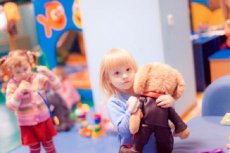Hyperactive children learn better at school
Last reviewed: 17.10.2021

All iLive content is medically reviewed or fact checked to ensure as much factual accuracy as possible.
We have strict sourcing guidelines and only link to reputable media sites, academic research institutions and, whenever possible, medically peer reviewed studies. Note that the numbers in parentheses ([1], [2], etc.) are clickable links to these studies.
If you feel that any of our content is inaccurate, out-of-date, or otherwise questionable, please select it and press Ctrl + Enter.

Sooner or later the majority of parents come to the decision to give the child to kindergarten. Some are forced to return to work, some believe that a kindergarten will allow the child to socialize faster and tune in to further schooling.
Usually, parents are the most worried about hyperactive and very mobile children. It is difficult for them to imagine how a child-fidget, a real home typhoon, will be able to get along with discipline in the kindergarten and follow the instructions of educators.
However, experts from the University of Miami hastened to reassure the mothers of hyperactive children, which can not be said about the mothers of children shy and uncommunicative. Scientists believe that it is these children that are most at risk of being unable to adapt in a children's collective.
This study, which studies the social and academic successes of preschool children, is one of the first in this field. His results were published in the journal "School Psychology".
As it turned out, children with secretive character and unwillingness to make contact showed a low level of academic achievement, both at the beginning of the school year and one year after the training.
"It's not a secret that all parents want their children to know how to know and know the alphabet before kindergarten training, but few understand that social and emotional readiness is an important component of successful learning, from a young age," says Rebecca Bulotsky-Shearer, assistant professor of psychology at the University of Miami.
Problems in behavior begin when there is a mismatch between the child's capabilities and the load of the training program. As the results show, shy children begin to complex because of their ignorance.
"As a rule, closed children of preschool age are simply" lost "in the group," says Dr. Elizabeth Bell, PhD in psychology and co-author of the study. - The same thing happens in school. These children are locked in themselves and do not participate in the life of the class. "
Also, experts found that the excessively active behavior of their peers is due to the desire to attract the attention of the teacher. In the event that this line of behavior does work, more quiet children risk being deprived of the teacher's attention.
The most adapted to life in the group were the children who went to the garden at an older age. These children had fewer problems with adaptation and showed a higher level of social skills, literacy, ability to language and mathematics.
Experts hope that the results of the research will attract public opinion to this problem and then, perhaps, new approaches to solving the problem will be considered taking into account the needs of different children.

 [
[